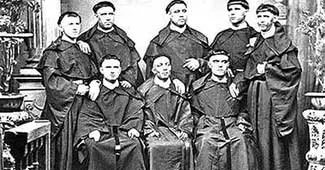The Power of the Clergy in Late 19th Century Batangas as Told by a Citizen of Lipa, Batangas
Everyone who was at one time or the other a student of Philippine History knows that among the reasons for the Philippine Revolution was the repressive rule of the Spaniards in the country over more than three hundred years of colonization. This repression was, in no small measure, due to the often misused power of the clergy, later bedeviled in Philippine History books.
There were other reasons, of course, but towards the end of the nineteenth century, the seeds of nationalistic fervor spawned in Latin America and the Spanish Caribbean1 had spilled over across the Pacific to the country, fueled by increasingly “brutal Spanish rule... (that) restricted Filipino religious rights and political participation in their own governance2.”
This repressive regime was felt in Batangas as well, where many Batangueños — from the common man who took up arms to the intelligentsia who supplied not just the political ideals but the necessary funds as well — had grown disillusioned with Spanish rule and were prepared to fight for independence.
A vivid picture of the tyranny and decadence imposed on the country by the Spanish colonial and church officials — at a time when there was no clear separation between the powers of the church and the state — was provided by a local citizen of the then-municipality of Lipa in his testimony during a hearing held by the American Civil Commission early in the 20th century. The hearing was held upon the wishes of the United States Senate to understand and rationalize ecclesiastical land ownerships in the country.
The citizen was one Jose Templo, at the time of the hearing a 53-year old landowner and agriculturist. Templo was not a common farmer. In fact, he belonged to one of the municipality’s most prominent families and was an educated man, having studied Philosophy, Canonical Law, and Spanish Civil Law at the Univesity of Santo Tomas3.
In his testimony, Templo gave a scathing assessment of the friars who wielded tremendous power during the recent Spanish occupation. He described them as the “corrupters of youth” and said that their actions “were not responsive to their pious calling as missionaries and teachers of the natives.”
During Lent, Templo told the commission, the parish friar made it a point to be the one to hear the confessions of “young, unmarried country women” and servant penitents whom “he obscenely solicited through words and manipulations in the confessional.”
As if to indicate that governance during the Spanish era was, for all intents and purposes, a theocracy, Templo told the commission of this practice introduced by the friars of requiring town authorities and headmen to present themselves at the convent every Sunday after High Mass to kiss the hand of the parish friar. The men were received at the stairs and not even invited into the salons, something which Templo called “very humiliating to the Filipinos.”
Anytime a provincial of the Augustinians visited a pueblo, this became, in fact, a “grievous occasion” for municipal officials and headmen because everyone from the municipal captain4 to the constable could not attend to his duties because of the countless demands made by the local friars. This endless string of demands, ostensibly to please the visiting provincial, ranged from the provision of “horse, carriages and carts for the provincial and his retinue” to “communal laborers for other work that might be needed.”
Templo called the friars the “masters of the pueblo.” Making a clear point that, in his estimate, the friars were, in fact, more powerful than civil officials, he told the commission that they were “venerated and deified for the simple reason that they were the friends and patrons of the heads of the province.”
Beyond being friends with provincial officials, Templo even suggested that the latter, in fact, feared the friars. Furthermore, he also hinted that he thought that even the governor-general of the Philippine Islands likewise feared the friars “because of their powerful influence in the court where they had, and each corporation has, a procurator-general, who maintains their prestige safe in their inviolability.”
Asked about the political functions performed by the parish priests, Templo stated that they intervened in many acts of the municipal government; and in so doing, “committing the gravest abuses and scandals.” A municipal captain who did not follow the suggestions of the friars could be put into jail or frequently fined by the governor since, as mentioned earlier, the friars also wielded great influence over the latter.
This presumptuous power of the friars in the late 19th century was, of course, to be their own undoing. As Templo stated, the friars were “feared and hated by the natives.” Although their power was, to an extent, because of the fear of the common citizens, in time, this fear would be overcome by the simmering hatred that would, in time, become the fuel for what was to come — the Philippine Revolution.
2 “Perspectives in History: Philippine Revolution (1896-1898), online at the Shapiro Library, Southern New Hampshire University.
3 Details of Jose Templo’s testimony taken from “Lands Held for Ccclesiastical or Religious Uses in the Philippine Islands, etc.,” compiled by the United States War Department, 1901, online at the Internet Archive.
4 The “municipal captain” was the equivalent of the mayor in the present time.

